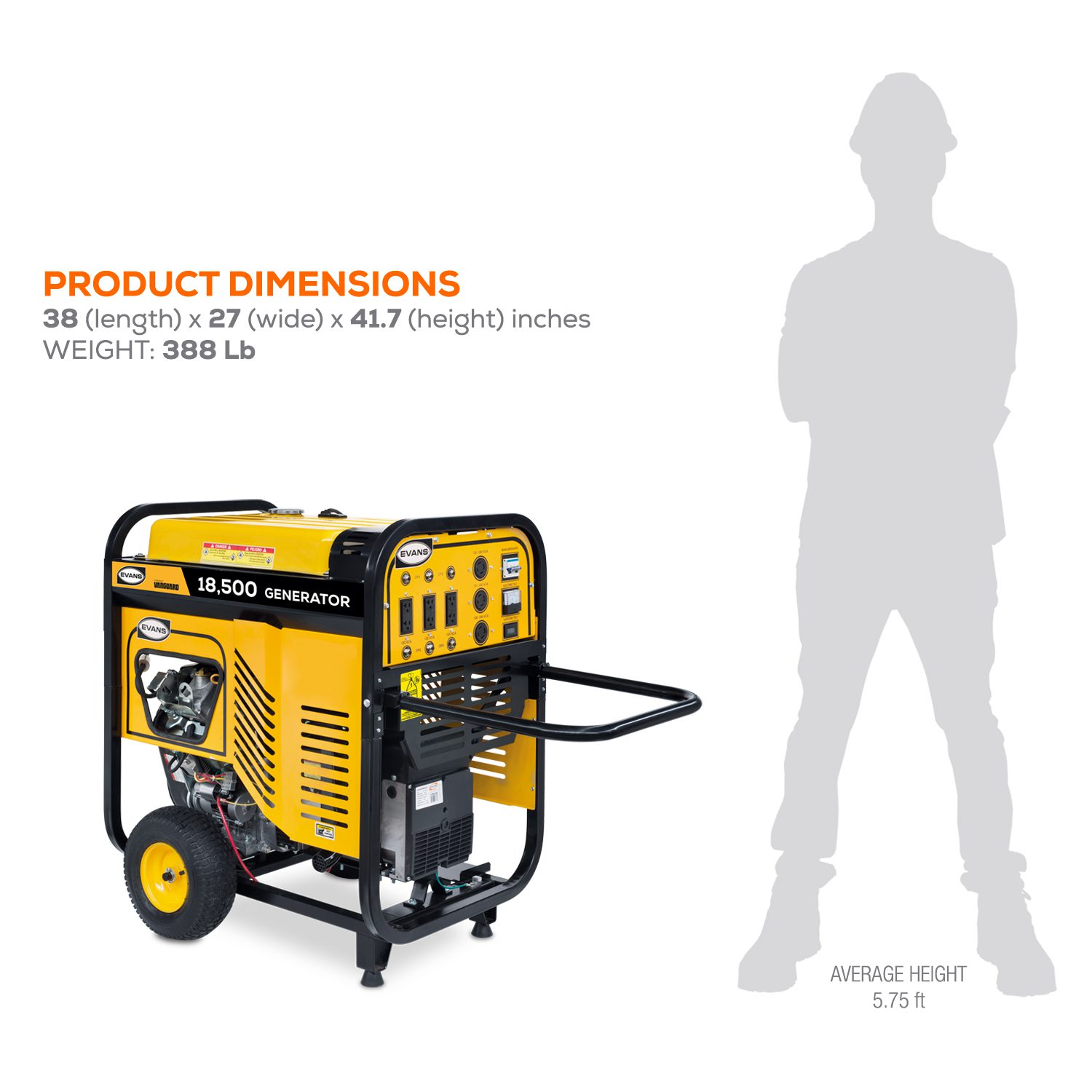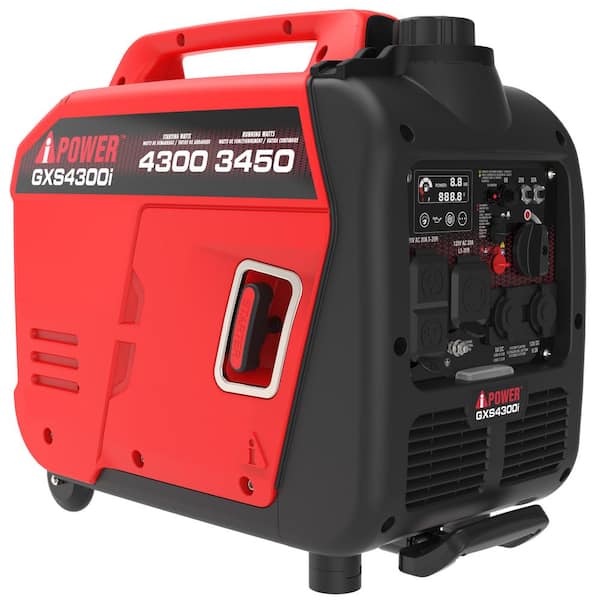Disclosure: This post contains affiliate links and I will be compensated if you make a purchase after clicking through my links. Learn More
A generator can weigh anywhere from 40 pounds to over 2,000 pounds. The weight varies based on type and power capacity.
Generators are essential for backup power in homes, businesses, and outdoor activities. They come in various sizes, types, and capacities. Portable generators are light, often weighing between 40 and 250 pounds. Stationary and industrial generators are much heavier, ranging from 500 to over 2,000 pounds.
The weight depends on the engine size, fuel type, and additional features. Understanding these factors helps in choosing the right generator for your needs. Consider transportability, installation, and storage when selecting a generator. Proper knowledge ensures you make an informed decision, balancing weight and power requirements.
Types Of Generators
Generators come in various types. Each type has its unique features and uses. Understanding the differences helps in choosing the right one for your needs.
Portable Generators
Portable generators are easy to move. They are suitable for camping trips or temporary power needs. These generators usually weigh between 50 to 250 pounds. The weight depends on the power capacity and fuel type.
- Lightweight models: 50-100 pounds
- Medium-weight models: 100-150 pounds
- Heavy-duty models: 150-250 pounds
The weight can affect how easy it is to transport. Consider the weight before making a purchase.
Standby Generators
Standby generators are larger and heavier. They provide power during long outages. These generators are usually installed permanently. The weight can range from 300 to over 1,000 pounds.
| Power Capacity | Weight Range |
|---|---|
| Low capacity (7-10 kW) | 300-500 pounds |
| Medium capacity (10-20 kW) | 500-800 pounds |
| High capacity (20+ kW) | 800-1,000+ pounds |
The weight is due to the robust construction. These generators need to be durable and reliable.

Credit: evansproducts.com
Factors Affecting Weight
Understanding the weight of a generator is essential. Several factors influence a generator’s weight. These factors can vary greatly. Knowing these can help you choose the right generator.
Power Output
Generators with higher power output tend to be heavier. This is due to the larger engines and components required. A generator with 10,000 watts will weigh more than a 2,000-watt generator.
Below is a table showing the relation between power output and weight:
| Power Output (Watts) | Weight (lbs) |
|---|---|
| 2,000 | 50 |
| 5,000 | 120 |
| 10,000 | 250 |
Fuel Type
The fuel type also affects the weight. Diesel generators are generally heavier than gasoline ones. Propane and natural gas generators vary in weight. This is due to the different engines and fuel tanks required.
Materials Used
The materials used in construction influence the weight. Generators made from steel are heavier. Aluminum and plastic parts can reduce the weight. The quality of materials also matters. High-quality components might weigh more.
Consider the following points:
- Steel casing adds durability but increases weight.
- Plastic parts are lighter but less durable.
- Aluminum offers a balance between weight and strength.
Each material has its pros and cons.
Portable Generator Weights
Understanding the weight of portable generators is crucial. It helps in choosing the right model for your needs. There are lightweight models and heavy-duty models. Each has its own advantages. Let’s explore the different categories.
Lightweight Models
Lightweight portable generators are easy to move. They are ideal for small tasks.
- Weight range: 30 to 70 pounds
- Power output: 1,000 to 2,000 watts
These models are perfect for camping or tailgating. Their compact size is a big plus. You can store them easily. They fit in small spaces.
Heavy-duty Models
Heavy-duty portable generators are built for bigger tasks. They are heavier but more powerful.
- Weight range: 100 to 250 pounds
- Power output: 3,000 to 10,000 watts
These models can power multiple appliances. They are great for construction sites. They are also useful during power outages. Make sure you have help to move them.
Below is a table summarizing the weight and power output of different models:
| Type | Weight Range | Power Output |
|---|---|---|
| Lightweight Models | 30 to 70 pounds | 1,000 to 2,000 watts |
| Heavy-Duty Models | 100 to 250 pounds | 3,000 to 10,000 watts |

Standby Generator Weights
Standby generators are essential for backup power. Knowing their weight helps with installation and transport. Different models have different weights. Let’s explore residential and commercial models.
Residential Models
Residential standby generators are smaller. They are designed for homes. These generators are easier to move and install.
- Small models: 200-300 lbs
- Medium models: 300-400 lbs
- Large models: 400-600 lbs
Small models are typically around 200-300 lbs. They are ideal for small homes. Medium models range from 300-400 lbs. These suit medium-sized homes. Large models can weigh 400-600 lbs. They are perfect for large homes.
Commercial Models
Commercial standby generators are larger. They are built for businesses and large buildings. These generators are heavier and more powerful.
| Model Type | Weight Range (lbs) |
|---|---|
| Light-duty | 600-1,000 lbs |
| Medium-duty | 1,000-2,000 lbs |
| Heavy-duty | 2,000-5,000 lbs |
Light-duty models weigh 600-1,000 lbs. They are good for small businesses. Medium-duty models range from 1,000-2,000 lbs. These are suitable for medium-sized businesses. Heavy-duty models can weigh 2,000-5,000 lbs. They are used in large businesses and factories.
Impact Of Weight On Usage
Generator weight plays a crucial role in its usability. Heavier generators offer more power but can be harder to move and install. Lightweight generators are easier to handle but might not deliver the same power output. Understanding the impact of generator weight on usage helps make informed decisions.
Ease Of Transport
Transporting a generator depends heavily on its weight. Lighter generators are easy to carry by hand. They are ideal for camping or outdoor events. They fit easily in car trunks and can be moved by one person.
Heavier generators usually need wheels or carts. They are suitable for home backup or job sites. Moving them requires more effort and sometimes two people. The added weight often means more power and longer run times.
Installation Considerations
Installing a generator involves considering its weight. Lighter models can be set up quickly. They require less effort and fewer tools. They are perfect for temporary setups or small spaces.
Heavier generators need a more permanent installation. They might require a concrete pad or a sturdy platform. Professional installation is often recommended. The weight also affects the choice of location, ensuring it can support the generator safely.
Weight impacts both ease of transport and installation. Choose wisely based on your needs and capabilities.
Comparing Brands And Models
Choosing the right generator depends on many factors, including weight. Different brands and models offer various weights, impacting portability and usage. This section compares popular brands and models, helping you make an informed decision.
Top Brands Overview
Several top brands dominate the generator market. Let’s look at their offerings.
| Brand | Average Weight (lbs) |
|---|---|
| Honda | 100 – 200 |
| Generac | 150 – 250 |
| Champion | 120 – 220 |
| Yamaha | 90 – 190 |
| Westinghouse | 130 – 230 |
Popular Models
Here are some popular models and their weights:
- Honda EU2200i: Weighs 47 pounds. Ideal for camping.
- Generac GP3300: Weighs 105 pounds. Suitable for home backup.
- Champion 3400-Watt Dual Fuel: Weighs 95 pounds. Great for RVs.
- Yamaha EF2000iSv2: Weighs 44 pounds. Perfect for small power needs.
- Westinghouse WGen7500: Weighs 192 pounds. Best for large power requirements.
Tips For Choosing The Right Generator
Choosing the right generator involves understanding your needs and balancing weight and performance. This guide will help you make an informed decision.
Assessing Your Needs
First, determine the power requirements of your appliances. Create a list of essential devices you want to power. Calculate their total wattage. This helps you choose a generator that meets your power needs.
- Household appliances: Fridge, microwave, lights, etc.
- Outdoor activities: RV, camping gear, etc.
- Business use: Computers, cash registers, etc.
Consider the generator’s runtime. Longer runtimes mean fewer refueling breaks. Check the fuel type. Common options include gasoline, propane, and diesel. Think about noise levels. Quieter generators are better for residential areas.
Balancing Weight And Performance
The weight of a generator affects its portability. Lighter models are easier to move. Heavier models usually offer more power. Striking a balance is crucial.
| Type | Weight | Power Output |
|---|---|---|
| Portable | 20-100 lbs | 1,000-3,000 watts |
| Inverter | 30-60 lbs | 1,000-4,000 watts |
| Standby | 200-600 lbs | 5,000-20,000 watts |
Consider the portability of the generator. Portable generators are easier to transport. Inverter generators offer a good balance of weight and power. Standby generators provide the most power but are heavy.
Think about the generator’s fuel efficiency. More efficient models save money on fuel. Look at the generator’s maintenance requirements. Some models require more frequent servicing.

Frequently Asked Questions
How Much Does A Portable Generator Weigh?
Portable generators typically weigh between 50 to 250 pounds, depending on their power output and build quality.
What Factors Affect Generator Weight?
Generator weight is influenced by engine size, fuel tank capacity, and additional features like soundproofing and wheels.
Are Heavier Generators More Powerful?
Generally, heavier generators have larger engines and fuel tanks, which can provide more power and longer run times.
Can One Person Lift A Generator?
Smaller portable generators can be lifted by one person, but larger models may require two people or mechanical assistance.
Final Words
Understanding generator weight helps make informed buying decisions. Consider purpose, mobility, and space before purchasing. Choose wisely to meet your needs. With this knowledge, you can select the right generator that balances power and portability. Always check specifications for optimal performance and convenience.
Happy generator shopping!








